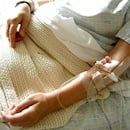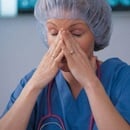
Focus on Safety: Serious Reportable Events
There is an increasing focus on patient safety and preventing harm in the healthcare arena. The Institute of Medicine (IOM) provided a report in 1999 that stated that approximately 98,000 people die each year in the United States due to medical errors. In response to this report, the Agency for Healthcare Research and Quality (AHRQ) partnered with the National Quality Forum (NQF) to identify patient safety measurements (Patient Safety Forum, 2014).
The term serious reportable events (SRE) is used interchangeably with Never Events. Simply defined, these are serious adverse events that are usually preventable, and ones that should never happen in healthcare facilities. NQF produced the first list of Never Events in 2002, with a revised list in 2011 (NQF, 2011). The list of events may be applied in various settings, such as acute inpatient, long-term or skilled nursing, or ambulatory settings. The current list of these events is comprised of seven categories emphasizing the following events (NQF, 2015):
Surgical or Invasive Procedure Events
- Surgery or other invasive procedure performed on the wrong site
- Surgery or other invasive procedure performed on the wrong patient
- Wrong surgical or other invasive procedure performed on a patient
- Unintended retention of a foreign object in a patient after surgery or other invasive procedure
- Intraoperative or immediately postoperative/post-procedure death in an ASA Class 1 patient
Product or Device Events
- Patient death or serious injury associated with the use of contaminated
- Drugs, devices, or biologics provided by the healthcare facility
- Patient death or serious injury associated with the use or function of a device in patient care, in which the device is used or functions other than as intended
- Patient death or serious injury associated with intravascular air embolism that occurs while being cared for in a healthcare setting
Patient Protection Events
- Discharge or release of a patient/resident of any age, who is unable to make decisions, to other than an authorized person
- Patient death or serious injury associated with patient elopement
- Patient suicide attempted suicide or self-harm that results in serious injury while being cared for in a healthcare setting
Care Management Events
- Patient death or serious injury associated with a medication error (e.g., errors involving the wrong drug, wrong dose, wrong patient, wrong time, wrong rate, wrong preparation, or wrong route of administration)
- Patient death or serious injury associated with unsafe administration of blood products
- Maternal death or serious injury associated with labor or delivery in a low-risk pregnancy while being cared for in a healthcare setting
- Death or serious injury of a neonate associated with labor or delivery in a low-risk pregnancy
- Patient death or serious injury associated with a fall while being cared for in a healthcare setting
- Any Stage 3, Stage 4, and unstageable pressure ulcers acquired after admission/presentation to a healthcare setting
- Artificial insemination with the wrong donor sperm or wrong egg
- Patient death or serious injury resulting from the irretrievable loss of an irreplaceable biological specimen
Environmental Events
- Patient death or serious injury resulting from failure to follow up or communicate laboratory, pathology, or radiology test results
- Patient or staff death or serious injury associated with an electric shock in the course of a patient care process in a healthcare setting
- Any incident in which systems designated for oxygen or other gas to be delivered to a patient contain no gas, the wrong gas, or are contaminated by toxic substances
- Patient or staff death or serious injury associated with a burn incurred from any source in the course of a patient care process in a healthcare setting
- Patient death or serious injury associated with the use of physical restraints or bedrails while being cared for in a healthcare setting
Radiologic Events
- Death or serious injury of a patient or staff associated with the introduction of a metallic object into the MRI area
Potential Criminal Events
- Any instance of care ordered by or provided by someone impersonating a physician, nurse, pharmacist, or another licensed healthcare provider
- Abduction of a patient/resident of any age
- Sexual abuse/assault on a patient or staff member within or on the grounds of a healthcare setting
- Death or serious injury of a patient or staff member resulting from a physical assault that occurs within or on the grounds of a healthcare setting
An occurrence of a Never Event (or SRE) must be reported to the Centers for Medicare and Medicaid Services (CMS) as well as the accreditation agency for the facility. Some states also require reporting although, as of today, not all states mandate reporting. These negative events cause physical and emotional harm to the patient, as well as financial implications. An SRE will also affect reimbursement, and incur additional costs for the facility.
Nursing staff plays a vital role in preventing SREs. Thorough assessment, vigilance with patient safety, adherence to policies and procedures, use of critical thinking, and accurate documentation are all important areas of nursing practice. Together we can prevent serious reportable events.
Biography:
Kim Maryniak has more than 26 years of nursing experience in medical/surgical, psychiatry, pediatrics, and neonatal intensive care nursing. She has been a staff nurse, charge nurse, educator, instructor, manager, and nursing director. Kim is certified in Neonatal Intensive Care Nursing and has been active in both the National Association of Neonatal Nurses and the American Nurses Association. Kim’s current and previous roles have included professional development and practice, research utilization, nursing peer review and advancement, education, infection control, nursing operations, and quality and process improvement.
References:
Institute of Medicine (IOM). (1999). To err is human. Washington, DC: Institute of Medicine.
National Quality Forum. (2011). Serious reportable events in healthcare 2011 update: A consensus report. Washington, DC: National Quality Forum.
National Quality Forum. (2015). List of SREs.
Patient Safety Forum. (2014). Never Events.




